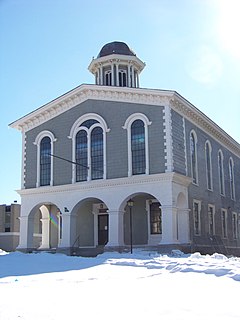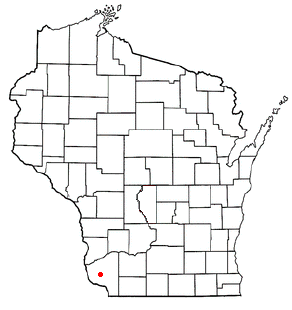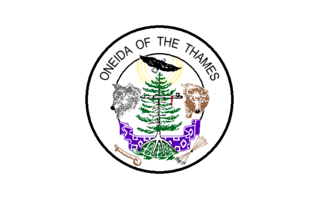Onyotaa:ka First Nation is a First Nations band government in Ontario. It is also known as the Oneida Nation of the Thames.
Onyotaa:ka First Nation is a First Nations band government in Ontario. It is also known as the Oneida Nation of the Thames.
Coordinates: 42°49′59″N81°24′43″W / 42.833°N 81.412°W

Madison County is a county located in the U.S. state of New York. As of the 2020 census, the population was 68,016. Its county seat is Wampsville. The county is named after James Madison, the fourth president of the United States, and was first formed in 1806.

Whitesboro is a village in Oneida County, New York, United States. The population was 3,772 at the 2010 census. The village was named after Hugh White, an early settler who had been adopted into the Oneida tribe and built the first permanent settlement there in 1784–85.

Beetown is a town in Grant County, Wisconsin, United States. The population was 734 at the 2000 census. The unincorporated communities of Beetown, Diamond Grove, Five Points, Flora Fountain, Hurricane, and North Andover are located in the town. The former community of Pleasant Ridge was also located in the town.
Oneida may refer to:

The Oneida are a Native American tribe and First Nations band. They are one of the five founding nations of the Iroquois Confederacy in the area of upstate New York, particularly near the Great Lakes.

The Nonintercourse Act is the collective name given to six statutes passed by the Congress in 1790, 1793, 1796, 1799, 1802, and 1834 to set Amerindian boundaries of reservations. The various Acts were also intended to regulate commerce between settlers and the natives. The most notable provisions of the Act regulate the inalienability of aboriginal title in the United States, a continuing source of litigation for almost 200 years. The prohibition on purchases of Indian lands without the approval of the federal government has its origins in the Royal Proclamation of 1763 and the Confederation Congress Proclamation of 1783.
Oneida is an Iroquoian language spoken primarily by the Oneida people in the U.S. states of New York and Wisconsin, and the Canadian province of Ontario. There is only a small handful of native speakers remaining today. Language revitalization efforts are in progress.

Lambton—Kent—Middlesex is a federal electoral district in Ontario, Canada, that has been represented in the House of Commons of Canada since 1997.

The Treaty of Canandaigua also known as the Pickering Treaty and the Calico Treaty, is a treaty signed after the American Revolutionary War between the Grand Council of the Six Nations and President George Washington representing the United States of America.
Norfolk—Haldimand was a federal electoral district represented in the House of Commons of Canada from 1968 to 1979. It was located in the province of Ontario. This riding was created in 1966 from parts of Brant—Haldimand and Norfolk ridings.
The Oneida Nation of Wisconsin is a federally recognized tribe of Oneida people, with a reservation located in parts of two counties on the west side of the Green Bay metropolitan area. The reservation was established by treaty in 1838, and was allotted to individual New York Oneida tribal members as part of an agreement with the U.S. government. The land was individually owned until the tribe was formed under the Indian Reorganization Act of 1934.

The Stockbridge–Munsee Community also known as the Mohican Nation Stockbridge–Munsee Band is a federally recognized Native American tribe formed in the late eighteenth century from communities of so-called "praying Indians", descended from Christianized members of two distinct groups: Mohicans and Wappinger from the praying town of Stockbridge, Massachusetts, and Munsees, from the area where present-day New York, Pennsylvania and New Jersey meet. Their land-base, the Stockbridge–Munsee Indian Reservation, is 22,000 acres located at 44°53′55″N88°51′42″W in Shawano County, Wisconsin. It encompasses the towns of Bartelme and Red Springs. Among their enterprises is the North Star Mohican Resort and Casino.

The Oneida Nation of the Thames is an Onyota'a:ka (Oneida) First Nations band government located in southwestern Ontario on what is commonly referred to as the "Oneida Settlement", located about a 30-minute drive from London, Ontario, Canada. The Oneida Nation reports a total of 6,108 members, including 2,159 residents.

Lambton—Kent—Middlesex is a provincial electoral district in southwestern Ontario, Canada. It elects one member to the Legislative Assembly of Ontario.
Westmount is a neighbourhood in the southwest part of London, Ontario, Canada. As of the 2016 Canadian census, the population of Westmount is 18,985 (2016). The top five ethnic origins are English, Scottish, Canadian, Irish, and German. The average income for the neighbourhood is $79,833, one of the highest in the city, however employment levels are down in comparison with the city. The top three occupations of Westmount residents are: Sales and Service occupations, Business & Finance, and Administration.

Elgin—Middlesex—London is a provincial electoral district in southwestern Ontario, Canada. It elects one member to the Legislative Assembly of Ontario.
City of Sherrill v. Oneida Indian Nation of New York, 544 U.S. 197 (2005), was a Supreme Court of the United States case in which the Court held that repurchase of traditional tribal lands 200 years later did not restore tribal sovereignty to that land. Justice Ruth Bader Ginsburg wrote the majority opinion.
County of Oneida v. Oneida Indian Nation of New York State, 470 U.S. 226 (1985), was a landmark United States Supreme Court case concerning aboriginal title in the United States. The case, sometimes referred to as Oneida II, was "the first Indian land claim case won on the basis of the Nonintercourse Act."
Confederation Congress Proclamation of 1783 was a proclamation by the Congress of the Confederation dated September 22, 1783 prohibiting the extinguishment of aboriginal title in the United States without the consent of the federal government. The policy underlying the proclamation was inaugurated by the Royal Proclamation of 1763, and continued after the ratification of the United States Constitution by the Nonintercourse Acts of 1790, 1793, 1796, 1799, 1802, and 1833.

Oneida Nation School System is a tribal K-12 school in Oneida, Wisconsin. It is affiliated with the Bureau of Indian Education (BIE), and serves the Oneida Nation.